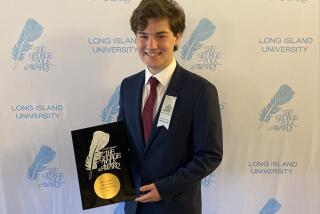NIH Scientist Gave Patient Samples to Pfizer, Got $600,000, Report Says
- Share via
WASHINGTON — A senior Alzheimer’s disease researcher at the National Institutes of Health pocketed more than $600,000 in fees from Pfizer Inc. while providing the drug company with thousands of samples of spinal fluid drawn from patients who were studied for his government work, congressional investigators said in a report made public Tuesday.
The new details about the conduct of the scientist, Dr. P. Trey Sunderland III, drew bipartisan criticism from members of an investigative panel of the House Energy and Commerce Committee.
The House members said Sunderland’s conduct raised broad questions about how the NIH accounted for materials harvested from patients -- materials that hold promise for finding cures or ways to better diagnose serious diseases.
Lax record-keeping regarding samples of human tissue leaves NIH laboratories “vulnerable to the risks of theft and abuse,” said the committee chairman, Rep. Joe L. Barton (R-Texas). “It would really be a shame if we find out that the National Institutes of Health has more control over its paper clips and trash cans than it has over its human tissue samples.”
The committee’s senior Democrat, Rep. John D. Dingell of Michigan, said: “NIH lacks adequate controls for human tissue samples, human subject protection and the scientific conduct of many of its senior employees. Accountability must be restored to NIH’s own research programs.”
Documents presented at a panel hearing Tuesday showed that from 1996 to 2004, Sunderland accepted consulting, speaking and advisory fees from Pfizer totaling about $612,000. The committee staff found that nearly half of the money, $285,000, was for his consulting related to the search for scientific clues in 3,245 samples taken from 538 patients who participated as volunteers at the NIH.
The committee staff estimated that, assuming a cost of $12,000 per research patient, it cost the government $6.45 million to collect the samples that Sunderland shipped to Pfizer.
An attorney for Sunderland, Robert F. Muse, said Tuesday that his client “did not conceal his relationship with Pfizer.” However, the committee staff noted that Sunderland did not obtain required written authorization from the NIH before he entered into paid arrangements with Pfizer and other drug companies.
The Los Angeles Times reported in January 2005 that, based on an internal review at the NIH, officials had referred Sunderland’s conduct for investigation by the inspector general of the U.S. Department of Health and Human Services.
The NIH last year banned all employees from accepting consulting fees or stock options from pharmaceutical and biotechnology companies.
A spokesman for the NIH, John Burklow, said Tuesday that officials could not discuss the Sunderland case because “it remains under investigation.” But Burklow said that even under the NIH’s earlier, more permissive ethics rules, federal employees were prohibited from outside arrangements that overlapped with their government work.
“It is important to note that the specific consulting arrangements in question, had they been known to NIH, would not have been approved under the present or previous ethics regulations,” Burklow said, adding: “We share the committee’s concerns in regard to the ethical management of human tissue samples and the development of rigorous and uniform policies to protect the public’s trust and interests.”
More to Read
Sign up for Essential California
The most important California stories and recommendations in your inbox every morning.
You may occasionally receive promotional content from the Los Angeles Times.











